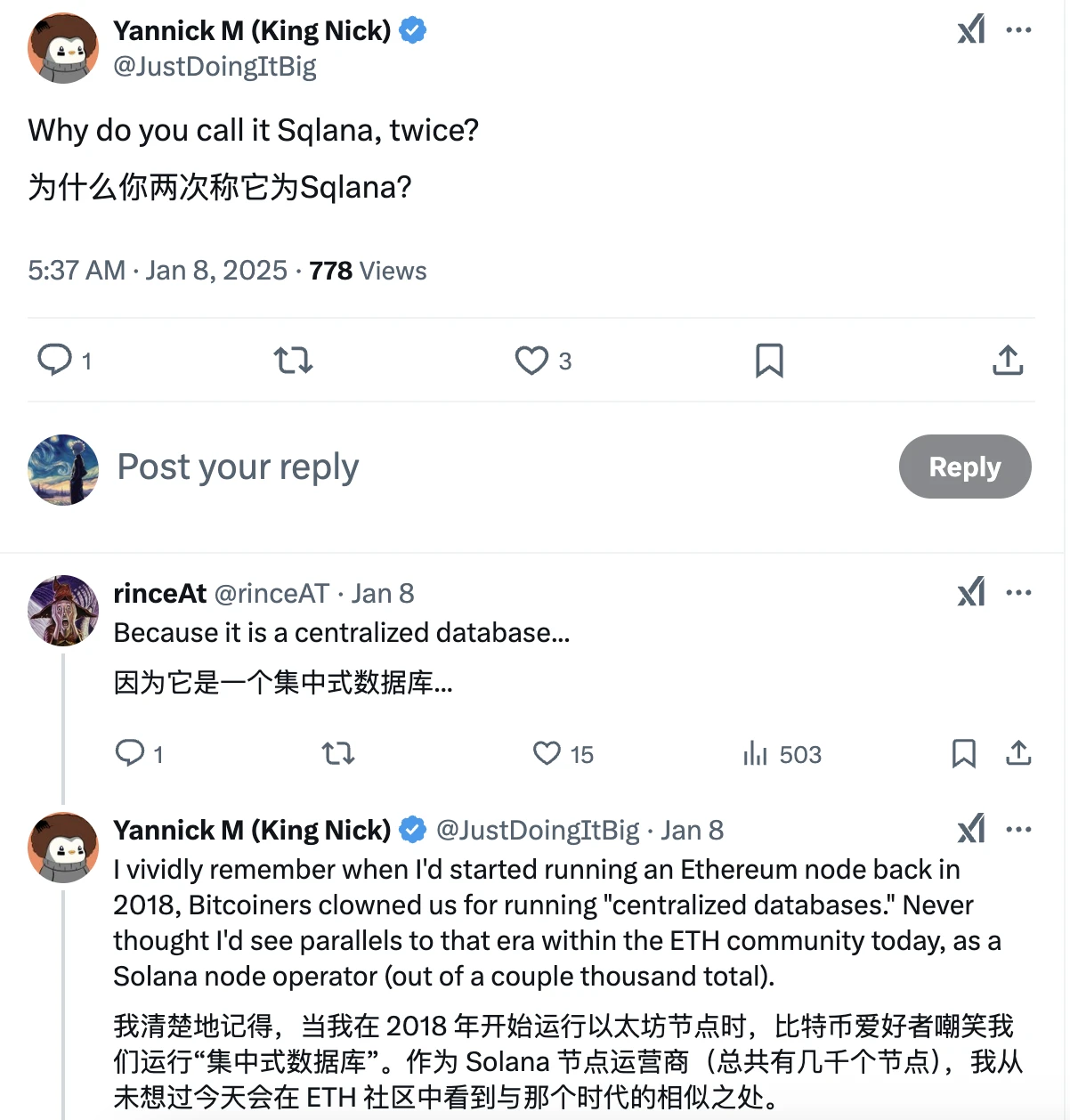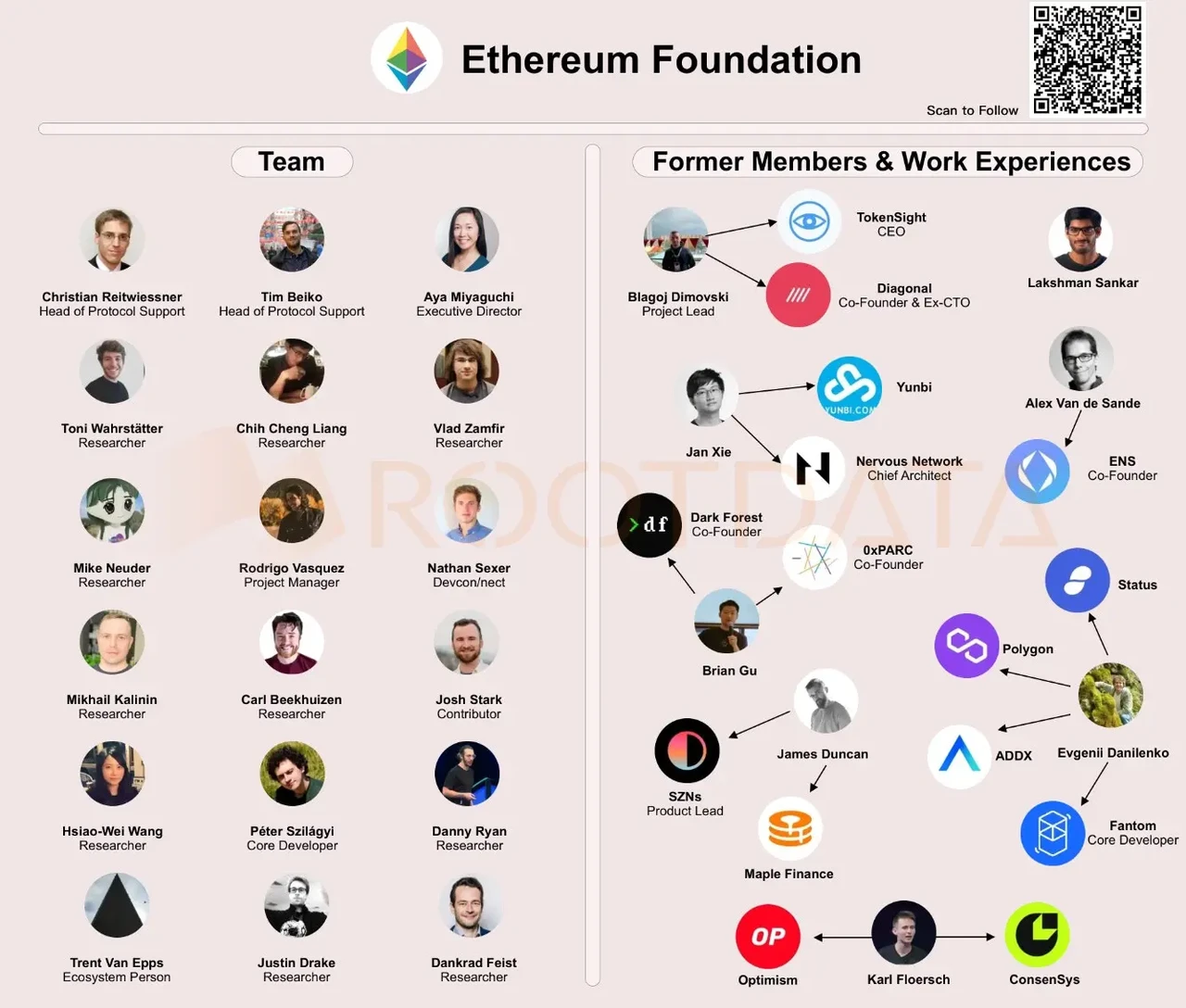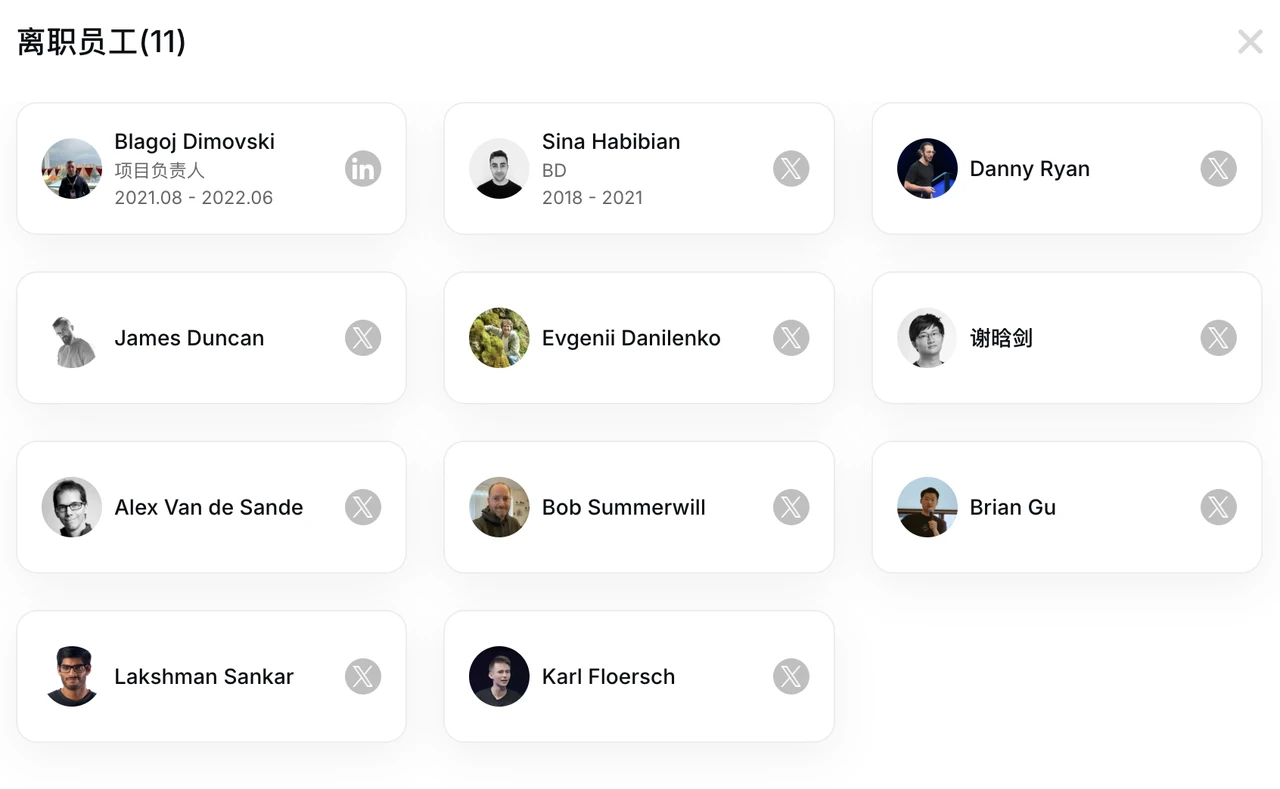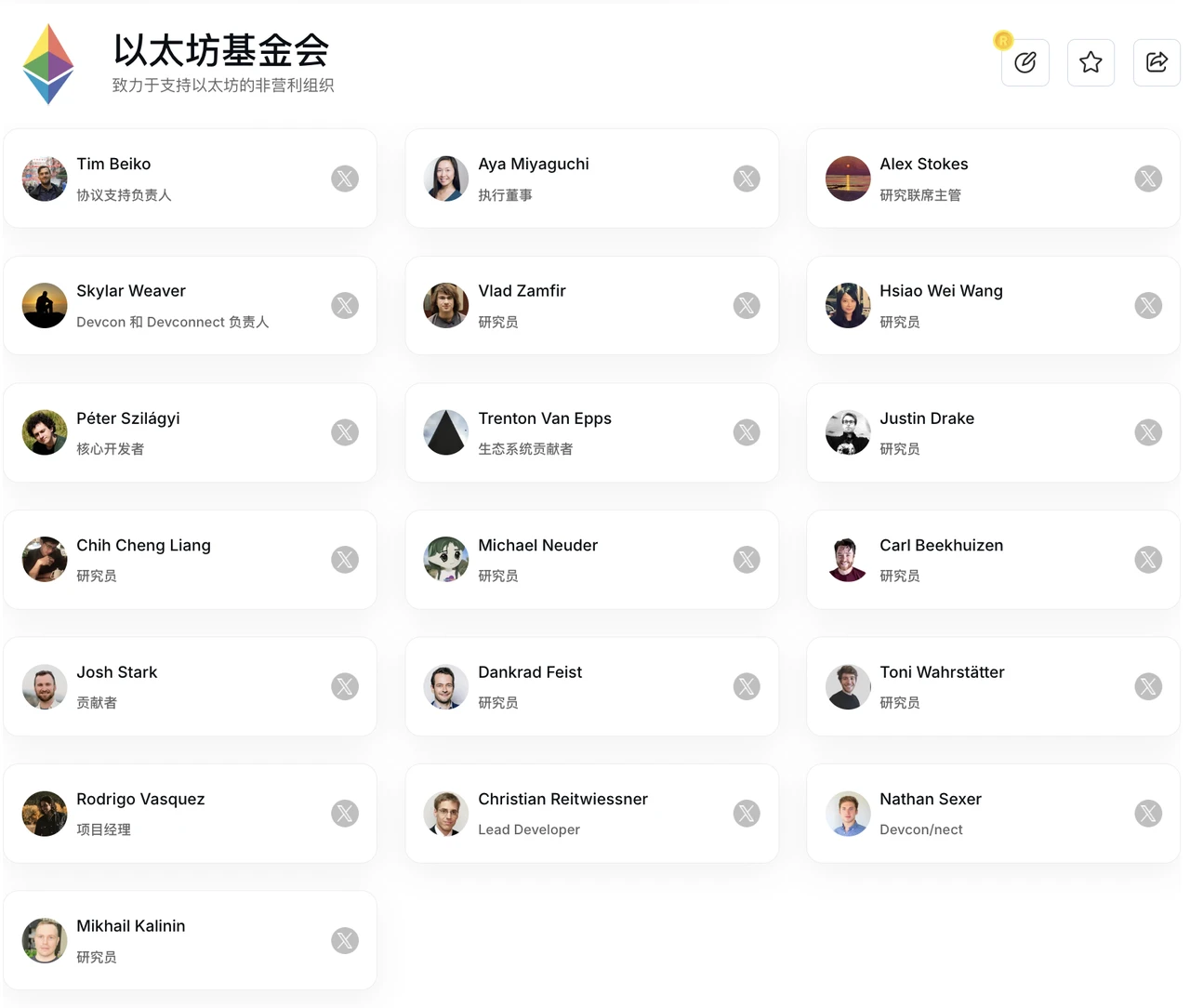Original|Odaily Planet Daily (@OdailyChina)

On January 18, Ethereum founder Vitalik published an article stating that "a large-scale reform of the leadership structure of the Ethereum Foundation (hereinafter referred to as EF) is underway."
The news stirred up a wave of reactions: some believe he has finally "found his way back"; others claim "it was about time to rectify the EF leadership that has been sitting idle"; and some think "due to the rapid development of the Solana ecosystem, the sense of crisis in the Ethereum ecosystem is unprecedentedly strong, and he is anxious."
It is certain that Vitalik is not the only one feeling anxious.
On the evening of January 22, Konstantin Lomashuk, the founder behind the important Ethereum infrastructure project Lido, first retweeted a post about a "second foundation," and later clarified that it was not a second EF, just an ordinary tweet. Last September, in response to the sluggish development of the Ethereum ecosystem, we provided a reference plan in the article "Is Ethereum 'sick'? Are these three remedies effective?", and it seems we were right.
But a more important question arises: How to revive the glory of the Ethereum ecosystem? Will EF reform be the dawn of revival? With such questions in mind, Odaily Planet Daily will systematically analyze the potential outcomes of the EF reform and the future direction of the Ethereum ecosystem in this article for readers' reference.
Arrogance and Prejudice: The Light and Dark Sides of the Ethereum Foundation
On January 18, Ethereum's spiritual leader and co-founder Vitalik Buterin stated that the large-scale reform of the EF leadership structure has been ongoing for nearly a year. In other words, throughout 2024, the EF leadership led by Vitalik has already begun a "self-revolution," but so far, we can conclude that: this self-revolution has had little effect.
Signals Released by Reform Goals: Focus on Ecosystem, No Intent to Involve Politics and Ideology
In light of this, Vitalik also mentioned that the main goals of this reform are:
To improve the technical expertise of the EF leadership;
To enhance two-way communication and connection between the EF leadership and new and old participants in the ecosystem; our responsibility is to support users (individuals and institutions), application developers, wallets, L2;
To introduce fresh blood and improve execution capability and speed;
To more actively support application developers, ensuring that important values and inalienable rights (especially privacy, open source, and anti-censorship) are realistically available to users, including those at the application layer;
To continue increasing the use of decentralized and privacy technologies as well as the Ethereum chain, including for payments and fund management.
Additionally, he emphasized that the goals of EF reform do not include:
Executing a shift in ideology/atmosphere (notably, he mentioned: from a feminized WEF soyboy mentality to a Bronze Age mentality, Odaily Planet Daily note: that is, from a softer, feminized perspective to an overly practical and success-driven male perspective);
Actively lobbying regulatory bodies and powerful political figures (especially in the U.S., with a focus on major powers), risking the status of Ethereum as a global neutral platform;
Becoming a battleground for vested interests;
Becoming a highly centralized organization, or even becoming the "protagonist" of Ethereum.
Finally, he mentioned: "These things are not what EF does, and that will not change. We welcome those seeking different visions to establish their own organizations."
Upon careful consideration, the goals Vitalik mentioned roughly mean: adhering to a technical approach; maintaining a decentralized philosophy; steadfastly executing the L2 development route; but specific measures remain unclear.** It is evident that Vitalik's approach to EF reform is still superficial, and the results are naturally predictable.**
The Most Controversial Focus of EF: Transparency, Work Output, and Dumping Speed
Returning to the root of EF's current predicament, I believe it mainly stems from the following three aspects:
First, the lack of information transparency. This is not only reflected in the vague statements regarding the foundation's funding expenditures but also relates to the delays in public disclosures, contrasting sharply with the agile efficiency of the Solana ecosystem. In December last year, the EF officially released the 2024 Q3 funding project update report, during which the total funding amount reached $12,848,780.33, covering areas such as community education, consensus layer, cryptography and zero-knowledge proofs, developer experience and tools, execution layer, L2, protocol growth and support, etc. Notably, community education projects accounted for the highest proportion, including events like Blockchain Summer Bootcamp, BlockHack, Building Builders, etc. Furthermore, the foundation continues to support the development of consensus layer clients like Lighthouse, Nimbus, Grandine, as well as development tools like Web3.js and OpenZeppelin account abstraction contracts. It is worth mentioning that, to my personal knowledge, the EF's funding has not been audited by any independent third-party organization. (If there are relevant examples, please feel free to correct me.)
At the same time, due to regional, temporal, and other limitations, the decision-making power regarding EF funding is held by a few individuals, which is also expected, leading to some community members who have contributed to ecosystem development not receiving the support they deserve. At the beginning of January, Evan Van Ness, founder of the Ethereum news weekly (Week in Ethereum News, abbreviated as WiE), stated: "Due to a conversation with the EF leadership at the beginning of this year, I announced that this newsletter will cease operations, as the communication indicated they believe continuing WiE is not valuable. For the remainder of 2024, WiE has received very little funding support from EF. Although most of this support is symbolic, the EF leadership's choice to cut off this trivial support clearly indicates that WiE will end immediately."
Second, the lack of proof of work. There is no effective proof of work visible to the outside world regarding EF's efforts. In the blockchain world, although the Ethereum ecosystem has shifted to a POS mechanism, from an organizational perspective, POW remains the most direct and relatively efficient operational model. In this regard, EF is undoubtedly a negative example. "What you did and what others know you did" are two completely different matters.
Moreover, this outcome also stems from the influence of the organizational structure. This has been one of the hotly debated topics in the crypto space recently, as crypto KOL @0xAllending pointed out, "One of the important reasons Solana can stand out in the competition among blockchain networks is its corporate management philosophy and intensity to challenge ETH's market position"; in contrast, the Ethereum ecosystem, especially EF, still remains in a community organizational form similar to "decentralized community autonomy, senior leadership + mid-level researchers/developers + ordinary community members/hodlers," dreaming of Mass Adoption under the banner of "world computer," which is nothing short of wishful thinking.**
Finally, the speed of dumping is extremely fast. This is the aspect that countless people criticize EF the most; it is not that other ecosystems do not have similar phenomena of selling ecosystem tokens, but rather that EF's dumping always seems to signal a peak, and often at this time, no one mentions "Ethereum faith, steadfast HODL ETH." Previously, according to Lookonchain monitoring, since EF sold 100 ETH on December 17, the price of ETH has dropped by about 17%. In 2024, EF sold 4,466 ETH (approximately $12.6 million) in 32 transactions, of which 15 transactions were made at short-term peak prices.

EF has long been a "Top Signal"
It is worth mentioning that previous data from Token Terminal showed that Ethereum L1 network revenue has plummeted, dropping 99% since March 2024. On March 5, Ethereum Layer 1 network revenue peaked at over $35 million; however, by September 2, daily revenue had fallen to about $200,000, marking the lowest daily revenue point of the year. At that time, cryptocurrency analyst Kun warned that if this trend continues, L2 networks may dominate and potentially abandon Ethereum's mainnet, especially for consumer applications. Although this revenue eventually recovered to pre-Dencun upgrade levels by the end of 2024, the decline in Ethereum mainnet protocol revenue has begun to show.
Upon examining the underlying reasons, perhaps arrogance and prejudice are the primary culprits.
Underlying Reasons: Arrogance is the Original Sin, Prejudice is the Shackles
EF researcher Justin Drake stated in early December last year that the golden age of Solana is about to end and will not pose a threat to Ethereum. Despite Solana's strong development momentum, Drake said, "Ethereum focuses on long-term gains (does this sound familiar?)." "Solana is currently at its peak, but I believe this will mark the end of Solana's golden age, as all of Solana's competitive advantages in latency and throughput will disappear due to fundamental architectural differences that make it non-scalable." Currently, Ethereum developers heavily rely on Layer 2 to provide faster and cheaper transaction fees. Drake stated, "I believe Ethereum L1 is competing with the Bitcoin ecosystem, while L2 networks are competing with Solana. Therefore, competing with Solana is not even within the scope of Ethereum L1's responsibilities; we should compete in terms of security and health. Thus, if Solana has any competition, it needs to come from applications and L2 networks."
Coincidentally, in response to the tweet announcing the closure of the Ethereum news weekly, founder Evan Van Ness referred to "Solana" as "Sqlana," seemingly implying that Solana is a centralized database, a point that was also mentioned in the comments. Senior node operator @JustDoingItBig expressed confusion: In 2018, Bitcoin believers mocked Ethereum nodes for running a "centralized database"; now, Ethereum supporters are behaving similarly.

One can only say that history has always rhymed.
As for the views on EF, from my personal observation, most Ethereum community members still support it positively, while the dissatisfied voices mainly come from ETH traders or market retail investors. Among them, community member fishbiscuit (@not_qz) may represent a considerable portion of "EF loyalists," as he previously responded to multiple community criticisms of the foundation, clarifying that:
Social media activity: Similar to the Solana Foundation, EF primarily retweeted content in the past but has recently begun to publish updates more actively;
On-chain usage: The foundation has staked 42,000 ETH to support client development, while also funding on-chain projects like EIP-1559 NFT and Beacon Book, and providing grants through the mainnet and L2. Events like Devcon also support crypto payments;
ETH sell-off: In response to accusations of the foundation selling ETH, he pointed out that the foundation's actions are part of various strategies to balance market pressure and called on the community to avoid double standards, while emphasizing the regulatory challenges faced by the foundation. He urged the community to view the foundation's contributions rationally and encouraged more constructive discussions.
It must be said that despite the many issues with EF, the community's attitude remains extremely tolerant.
To some extent, this once again verifies a fact: the butt decides the brain; since we are already on the Ethereum ship, we can only weather the storm together.
Conflict Focus: Vitalik Under Pressure, Attacked Executive Director Aya, and Fragmented Ethereum Community
As time goes on, many contradictions related to the EF reform are gradually surfacing, with the focus directed at Ethereum founder Vitalik, EF Executive Director Aya, and the currently fragmented Ethereum community.
The Dilemma of Ethereum's Spiritual Leader: Proactive Change vs. Past Friendships
Since the announcement of the EF reform on the 18th, Vitalik has undoubtedly found himself at the center of multiple pressures: on one hand, the poor performance of ETH prices and the departure of the ETH ecosystem from its high growth period urgently need to be changed; on the other hand, the core team of EF is also facing a painful transformation period, marked by events such as "EF researchers Justin Drake and Dankrad Feist joining Eigenlayer, and core researcher Danny Ryan leaving EF last year," putting past "revolutionary friendships" to the test.
Recently, the news that early Ethereum core developer Eric Conner announced his exit from the Ethereum community has sparked heated discussions (although, according to a member of the Ethereum community, this is not the first time he has made such a "farewell"), but unlike before, he also stated that as Vitalik Buterin gradually retreats behind the scenes, the opacity of EF and the sense of disconnection from the community are becoming increasingly strong. He pointed out that EF currently exhibits a "counter-victory and competitive mentality," which has led many community members to question whether to continue staying (this directly overlaps with the non-goals mentioned in Vitalik's previous "reform declaration").
According to information from Rootdata, there are currently 11 employees who have left EF, including early BD personnel and Danny Ryan, who led the transition to POS. According to a chart from last May, most of the departing EF members have chosen to start their own projects, and of course, most are still within the EVM ecosystem.

EF-related member information as of May 2024

List of EF departing employees
Meanwhile, the current EF staff includes Executive Director Aya, protocol support head Tim Beiko, and many researchers including Justin Drake. However, the chaos in organizational management has begun to reveal itself: not long ago, Ethereum Foundation researcher Alex Stokes announced that he would co-lead the EF research department with barnabe.eth, and until this point, many people learned for the first time that the EF research department includes five teams: application research group, consensus development, cryptography, protocol security, and RIG. This is similar to how people only learned about the rigidity of EF personnel movement when Tim Beiko posted information about new department recruits on his X platform account.

Current EF staff, totaling 16
The complex organizational management has brought about overwhelming doubts and debates, with many targeting EF Executive Director Aya.
In order to defend his "longtime comrade," the usually composed Vitalik had to step in to "play the role of a dictator"—on January 21, he posted in response to community doubts, stating, "I am the one who decides the new EF leadership team. One of the goals of the ongoing reform is to provide EF with a 'suitable board,' but before that, it is only me. If community members put pressure on the EF leadership, then they are creating an environment harmful to top talent."
EF Executive Director Aya's Middle Way: Opposing Speculation, Advocating "Zen" Philosophy
Many people may not know much about EF Executive Director Aya, but she is a key figure accompanying the development of the Ethereum ecosystem.
In the article “Where is the Road? Analyzing the Three Major Abstract Issues Facing the Current Ethereum Ecosystem”, we briefly introduced her. In a 2019 interview, she mentioned, "When it comes to a blockchain full of infinite possibilities (like Ethereum now), the path forward may not only include one, two, or three voices, but many voices. Our (referring to EF) job is to coordinate, but not to make actual decisions. Decisions can be made by our members, who can certainly be part of the decision-making process, but they do not have to be all of it."
In a Wired magazine interview in June 2023, Aya reiterated, "Regarding the cryptocurrency speculation wave, if I am the only one saying 'no,' it doesn't mean much, so I try to spread the same mindset among others, as if I were a Zen practitioner. Once this mindset takes root, people can be motivated without money, punishment, rules, or laws. This is because we are considering how to protect Ethereum culture after we and EF leave. If this mindset turns into a 'Zen' way, that would be great."
In this regard, Aya and Vitalik's views are highly consistent, which has drawn strong criticism from the current market. Countless people have launched attacks on Aya, calling for her to step down soon, and some have suggested that Danny Ryan should take over as EF Executive Director, forcing Ryan to clarify: "EF Executive Director Aya has contributed significantly to the development of Ethereum; please do not slander her casually," and reiterated: "Whether I am here or not, EF is continuously developing and getting better. I believe the Ethereum community will be one that develops in a respectful and rational manner."
According to LinkedIn information, Aya graduated from Seattle University’s business school in the United States and previously worked for the Japanese region at the cryptocurrency exchange Kraken. She joined EF as Executive Director in 2018 and has held the position since.
Fragmented Ethereum Community: Consensus, Liquidity, and Attention
The third major contradiction currently facing the Ethereum community is "fragmentation"—
First, there is fragmentation in the consensus regarding Ethereum's value, role, mission, vision, and short, medium, and long-term goals;
Second, there is fragmentation in the liquidity of funds within the Ethereum ecosystem caused by the L2 route, leading to ETH losing price support;
Finally, there is the critical issue of attention fragmentation in the cryptocurrency industry, where past attention has gradually shifted from the heavy and populous ETH to the hotspot-gathering and wealth-generating Solana.
In this regard, the thinking of Solana's ecosystem leaders is undoubtedly clearer. Previously, Solana co-founder Anatoly Yakovenko stated: “Solana is a ‘pure blockchain.’ No DA layer, no L2, no L3, no interference. Just a fast and cheap blockchain.”, “Multiple L2s are meaningless; if a single L2 can handle parallel execution, then it can use up all blob space and run every use case.”, “Only six important underlying smart contracts are needed; any developer options that increase business risk are negative.” Additionally, he stated in a debate with EF researchers: “The biggest problem Ethereum faces is the uncertainty of the long-term value of DA and the uncertainty of the vision of ETH as ‘ultrasound money.’” This view has also been supported by Uniswap founder Arthur Hayes.
Of course, to find a way out of the predicament, Ethereum needs more detailed solutions.
Three-Dimensional Solutions to the "Ethereum Dilemma": Ideas, Communication, and Positioning
Based on the above information, I believe that EF's search for solutions to the "Ethereum dilemma" includes the following three aspects:
Let Go of Prejudice and Obsession
First, the concept that the EF leadership, led by Vitalik, needs to correct is: no longer being obsessed with the long-term goal of being a "world computer," but rather focusing on short-term and medium-term practical matters.
Progress in this area includes the Ethereum Foundation announcing the activation of a new X account, the establishment of an institutional marketing department Etherealize aimed at promoting ETH to Wall Street (this initiative has received support from Vitalik and EF), and EF's decision to use 50,000 ETH (approximately $150 million) through a 3/5 multisig wallet to participate in the Ethereum DeFi ecosystem.
Additionally, latest news shows that Vitalik has finally stopped being obsessed with "maintaining the neutrality and transcendent status of the Ethereum mainnet" and unilaterally providing support to L2 networks, instead directly stating, "Encouraging Layer 2 to support ETH by contributing a certain percentage of fees can be achieved by burning part of the fees, permanently staking, and donating the proceeds to Ethereum ecosystem public goods or other schemes." For more information, see the article “Under Public Pressure, Vitalik Calls on L2: Support ETH Again”.
Once action begins on the issue of "dismantling fiefdoms," I believe the "ghost chain" problem within the EVM ecosystem will be further resolved.
Listen to the Community and Communicate Regularly
Second, EF can no longer act like an ostrich, burying its head in the sand and ignoring the external environment and community opinions. It is worth mentioning that while there is currently no "emperor" title for Vitalik within EF, he indeed holds the role of a "leader." Therefore, "favoring virtuous officials and distancing from petty people" is also a piece of advice; do not be blinded by the flattery and appeasement of those seeking Grants funding.
Less academic discussion and more regular AMAs with representative figures at the organizational level—if they are technical personnel, then discuss technology more; if they are market personnel, then talk more about the market; if they are just drawing a salary and making decisions arbitrarily, then it is best to ask them to leave EF early.
Most importantly, do not become trapped in a cocoon due to the existence of information silos.
Store of Value OR Means of Payment? That is the Question
Finally, there is the positioning of ETH and the Ethereum network. The fragmentation caused by dozens of L2 networks and the overwhelming power of past vested interest groups (i.e., too many profit-taking positions) make it increasingly difficult to realize ETH's store of value function; simply discussing the narrative of "digital silver" is becoming hard for the market to accept.
Means of payment are relatively more aligned with market demand; in this regard, the consumer chain of Coinbase Wallet discussed in the Base ecosystem may be one of Ethereum's future ecological focuses. Although Vitalik insists on ensuring the neutrality and decentralization of the Ethereum ecosystem, making cooperation related to the United States difficult to advance in the short term, this remains an unavoidable issue in the medium to long term.
Additionally, as Marc Zeller, founder of the Aave contribution team Aave Chan Initiative (ACI), previously stated, "To solve the problems of the Ethereum Foundation, it is necessary to: convert the remaining ETH of EF into market-tested LST combinations, cut current subsidies by 95%, especially initiatives like 'running nodes in Vorkuta,' do not sell ETH, but use LST to borrow stablecoins through Sky/Aave while reducing operational costs," which also has certain reference value.
Of course, the proposals to "fire 80% of non-developers and current leaders" and "hand over official accounts to several highly active ETH Maxis" seem somewhat one-sided.
Lastly, the community created by the Ethereum ecosystem, ultrasound.money, once united many ETH Maxis, but ultimately faded into obscurity; it must be said that this is a regretful matter. Perhaps with the EF reform, related communities will also welcome a transformation opportunity.
Conclusion: "Do Not Rest on Your Laurels, but Strive for New Achievements"
Perhaps in the early development of the Ethereum ecosystem, EF's hands-off leadership style led to the rapid growth of the Ethereum ecosystem. However, after experiencing several bull and bear cycles, if there is a grand vision of "mass adoption," then new solutions are needed, rather than being trapped in the past glory of "Ethereum as the first ecosystem in crypto," stagnating and refusing to progress.
The TRUMP token has brought millions of people into the cryptocurrency world, and it is understandable that people come for the wealth-generating effect. After all, compared to the Web2 world that sacrifices privacy and data, the attention effect and wealth creation frenzy are the "Trojan horse" that the crypto world can offer to the traditional financial world. When the future arrives, where the crypto economy further intertwines with the global financial system, we will see the bloom of crypto across the universe.
By eliminating wrong answers, we can have more courage and strength to face the new problems posed by the crypto world.
On this point, countless people walk with me, so I am full of confidence, and I hope you are too.
免责声明:本文章仅代表作者个人观点,不代表本平台的立场和观点。本文章仅供信息分享,不构成对任何人的任何投资建议。用户与作者之间的任何争议,与本平台无关。如网页中刊载的文章或图片涉及侵权,请提供相关的权利证明和身份证明发送邮件到support@aicoin.com,本平台相关工作人员将会进行核查。



